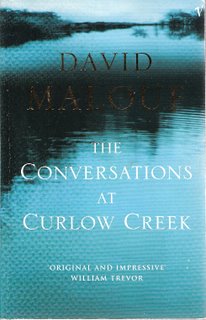 Review: The Conversations at Curlow Creek, David Malouf (1996)
Review: The Conversations at Curlow Creek, David Malouf (1996)With a measured pace and a poetic turn of phrase, Malouf brings into being a story the relevance of which is not at first clear. Sure, we’re introduced to a number of characters, but what it’s all about — that’s another question. It doesn’t really matter, though. There’s plenty here to satisfy the most demanding reader.
Michael Adair is some sort of government officer, a policeman or soldier, who has been sent out into the New South Wales bush to execute a bushranger who was captured after a long stake-out. He finds Carney in a dirty shed guarded by a bunch of fairly uncouth troopers.
Their harsh conversations contrast sharply with the gentle discussion Adair exchanges with Carney in the little shed near Curlow Creek with its long shelf, hanging spider webs, and overflowing chamber pot.
The book would adapt well to the screen, as it is extremely picturesque. In contrast to the dry, forbidding scrub of the Australian countryside lies the sweet, well-regulated existence Michael led as a child in country Ireland.
He still writes letters to Virgilia, the daughter of his neighbour back home. She lives with her father two miles away from the estate of Mr and Mrs Connellan (Aimee), who adopted Michael after his opera-singer parents were drowned in a shipwreck. As he grows up, he falls in love with Virgilia Fitzgibbon, just as he falls in step with his tutors and gets to know all the best authors of antiquity.
Fergus Connellan, who survives childbirth, is a few years younger than Michael, and fiercely devoted to him, but Michael knows that his own circumstances demand he make something of himself, independent of the estate that Fergus will one day inherit.
We are, of course, in the third decade of the nineteenth century. Imagine the bastard child of Jane Austen and John Banville, and you get some idea of the subject and style of this book.
Michael is a very well-adjusted child, mature beyond his years, who feels ashamed when Mama Aimee hugs him and demands his affection. He knows there is something wrong. Even as a small child, he had smelled something strange when he found himself up close to her body. Her alcoholism continues to disturb him in his teens.
Aimee is not well-adjusted and, having feared for years that Fergus, like her other dead children, would be taken away by the grim reaper if she grew too fond of him, now, when he is thirteen, resents him. He doesn’t like her, either.
Back at Curlow Creek, Adair eats pigeon stew and drinks strong billy tea prepared by the troopers. It is a weakness of the novel that the differences between these young men disappear when we return to them. This is unfortunate, given the care Malouf took at the start of the book to instil individuality into their characters. But we remember Michael’s story, and we possess a strong feeling for him because of the time we have spent with him as a youth.
The dearth of plot in the book is generally a weakness that makes us survive on virtually nothing at all. A man is to be executed, and while the troopers jibe at each other, their superior arrives and talks to the prisoner. On top of that we get a lot of information about the superior’s past life. Half-way through the novel, and that’s it. Very little story development to speak of. Very few clues as to why we spend so much time in Ireland at a time twenty years before the scene that dominates the narrative.
Wikipedia tells us that this scene “takes place in 1827”, but there is very little in the book to indicate the date, or the length of time between the current moment and Adair’s childhood. Another weakness.
Atmosphere is everything, for Malouf, plot almost an irrelevance. But what atmosphere!
As I said, this book should be made into a movie. In one scene, as they sit around the campfire in the darkness, one of the troopers picks up the boiling billy filled with hot tea and swings it round with his arm, three times. To settle the leaves. The horses move around among the trees. They tell stories.
The tenor of those stories contrasts succinctly with Michael’s thoughts. A modern man, raised on utopian notions, he contemplates his existence like a twentieth-century man. He is full of doubt, restless beyond the ken of a nineteenth-century soldier.
But it doesn’t matter. What is important in this book is the poetry. Somehow, out of this strange melange of modernity and olde-world scenes, an image of the colony emerges that is enough to fulfil our expectations. History may not rightly be the province of the novelist, but Malouf has attained a kind of poetic validity in his execution. The raw materials may be contradictory, but no less imperfect is our knowledge of the times he deals with.
In the end this is one man’s vision of another world, and it stands up to scrutiny. Perhaps Malouf’s chosen medium — the novel — rests in an ungainly fashion on the bones of his craft. Perhaps he is, essentially, a poet.
No comments:
Post a Comment